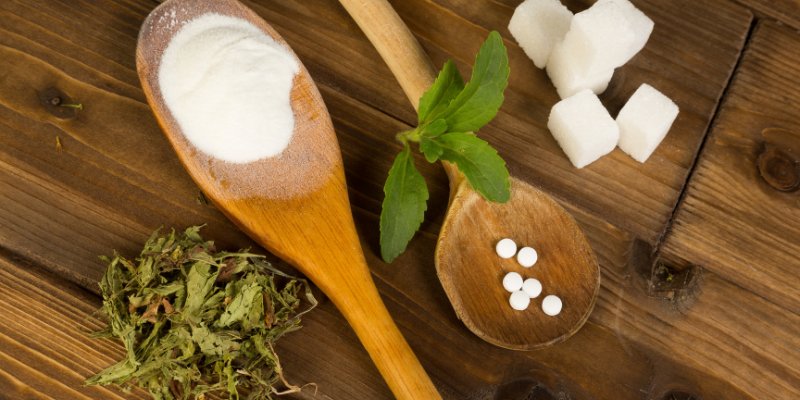The search for refined sugar alternatives has grown in pursuit of better diets. In addition to satisfying the sweet tooth, natural sweeteners are considered healthier than sugar. This book covers natural sugar alternatives' origins, qualities, culinary uses, and health benefits. Natural sweeteners are being studied as health concerns about refined sugar grow. Stevia, monk fruit, honey, maple syrup, coconut sugar, and xylitol are natural sweeteners that can replace refined sugar. Readers may evaluate their culinary tastes and health goals while using them by studying their properties and uses.

Stevia:
Natural sweetness and low blood sugar effect make Stevia, made from Stevia rebaudiana leaves, a standout sugar alternative. For delicious flavor without the health risks of refined sugar, stevia is calorie-free and as much as two hundred times sweeter than sugar. Its non-glycemic nature makes it ideal for diabetics and sugar-reducers.
Sweetened by steviol glycosides, stevia has been studied for its low blood sugar impact. Due to its excellent sweetness intensity, it requires different quantities in cooking and baking than regular sugar. Stevia comes as powder, liquid, and granules for culinary use.
Monk Fruit:
Monk fruit extract from the Siraitia grosvenorii plant is another popular natural sweetener since it tastes sweet without calories or blood sugar spikes. Mogrosides provide sweetness without the bitterness of other sugar replacements. This makes monk fruit a good choice for folks who want a sugar replacement that tastes like natural sugar.
Monk fruit includes antioxidants and anti-inflammatory qualities in addition to sweetening. Monk fruit sweeteners come in liquid, powder, and granule forms for cooking. Its unique flavor and natural origins make it attractive to individuals who want to cut sugar while enjoying their meals and drinks.
Honey:
Honey, made by honeybees from flower nectar, is sweet and flavorful. It contains fructose, glucose, minerals, and antioxidants, making it a more nutrient-dense refined sugar alternative. Honey has several flavors and colors to suit different tastes and calorie requirements. Its capacity to soothe sore throats and its use of natural medicines have made it a popular option. Honey is flexible enough to sweeten drinks, baked products, sauces, and marinades.
Maple Syrup:
Made from maple tree sap, maple syrup is a popular natural sweetener with a unique flavor and nutritional value. Maple syrup is more nutrient-dense than sugar since it contains vitamin E, antioxidants, manganese, and zinc. Its distinctive flavor makes it a popular option for adding sweetness to recipes while embracing maple's inherent character.
Maple syrup may top pancakes, waffles, bake, sauté, and glaze meals. Its grades provide varying flavors and intensities, making it versatile in taste and use. Maple syrup is famous as a natural sugar alternative due to its health advantages and sweetening characteristics.

Coconut Sugar:
Due to its lower glycemic index, coconut sugar, made from coconut palm tree sap, may replace refined sugar. This sweetener tastes like brown sugar but contains trace components, including iron, zinc, calcium, and antioxidants, separating it from processed sugar. Its mellow, caramel-like flavor and culinary adaptability are driving its appeal. From baking to sweetening drinks, health-conscious customers choose coconut sugar as a natural, tasty sugar replacement.
Coconut sugar's reduced blood sugar effect makes it appealing. This makes it a good choice for glycemic control and sugar reduction. Its granulated and liquid forms make it easy to use in recipes.
Xylitol:
Xylitol, a sugar alcohol made from plants or birch trees, is carefully made and has less calories than sugar. Besides sweetening, xylitol may prevent tooth decay by inhibiting oral microorganisms. This versatile sweetener is used in baking, cooking, and sweet desserts. Xylitol is a popular sugar replacement because it tastes like sugar without a strong aftertaste. However, moderation is advised with this delectable treat. Xylitol is delicious, but overindulging might cause stomach difficulties. Thus, enjoying xylitol in moderation guarantees a pleasant experience without adverse effects.
Providing guilt-free sweetness, xylitol is a tasty option for health-conscious enjoyment. This plant-derived sugar alternative from birch trees is low-calorie and fights tooth decay. Adding xylitol to baking and cooking opens up a world of delicious possibilities. As taste receptors enjoy the familiar sweetness of sugar, the lack of an aftertaste underlines xylitol's versatility and attractiveness for individuals balancing flavour and health. Moderation, the golden rule, lets you enjoy sweets without affecting your digestion.
Agave nectar:
Agave nectar is a popular alternative sweetener known for its organic status and unique flavor. Many cooks like agave nectar's gentle sweetness, similar to honey. Agave nectar is famous for its low glycemic index, making it a good option for managing blood sugar or reducing refined sugar consumption.
Bakers, cooks, and drinkers may utilize this natural sweetener. Its liquid shape and 1.5 times sweeter sweetness make it convenient for recipes. Like other sweeteners, agave nectar may replace sugar, but moderation is vital. Agave nectar's high sugar concentration has raised concerns about its liver and metabolic effects.
Balance and thoughtful eating are essential when using agave nectar as a sugar alternative. For those seeking a natural alternative to refined sugar, its distinct flavor, decreased glycemic effect, and culinary versatility make it appealing. Understanding its health risks and matching it to personal diets are crucial to choosing better sugar alternatives.
Conclusion:
This sugar replacement research concludes that a wide range of natural sweeteners is needed for people seeking healthier alternatives to refined sugar. It highlights these alternatives' low glycemic index and health benefits. The conclusion emphasizes the need for educated sugar choices based on health needs and culinary preferences.
The conclusion gently advises moderation and tolerance testing when adding natural sugar replacements to diets. This enables a balanced and personalized sugar consumption plan. Moderation helps people assess the effects of these alternatives on their health and nutrition, ensuring that sweeteners and health objectives work together.
The conclusion encourages people to seek natural sweeteners as refined sugar substitutes. It stresses the need for personalized and well-informed decisions, encouraging a more attentive and intentional approach to sugar consumption and a better lifestyle via mindful nutrition.




